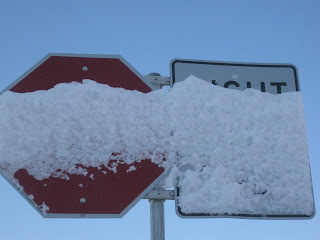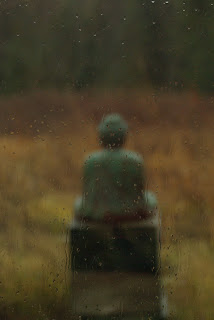 |
| Hidden Body Message from Austin TX |
I have been reading
The Chelsea Whistle by
Michelle Tea the last few days. I've owned this book for years, and I remember well when it came out in 2002, as I was working at
Rainbow Bookstore Cooperative* and Tea's face, via her dyke novel
Valencia, was all over the place. I already loved
Seal Press even then. I likely recommended The Chelsea Whistle to a few folks without having read it, as I often did back then, because, well, booksellers almost never have the time to read that, ironically, they would like.
The way I have been reading it the last few days of course relates to my last blog post about memoirs. Tea writes in a dense, terse style, with some images and a lot of feeling. Her editor did a fantastic job, as I noted in quick in the blog post can make a huge difference. She clearly feels little shame - now, at least - and mostly wrote the book in a state of reckoning, of discovery but not the first time discovery that happens with confession. Well-wrought without being over-processed, Chelsea Whistle (which refers to a special whistle the rough boys of her hood would use to call one another when in trouble, but she would never use because those boys *were* her trouble) is a powerful read.
I have a lot more to say about her style, about what it says about her processing, etc, but the main thing I wanted to say today ties to her speaking of being an outcast. I have been sick the last few days - thus all the time to read - and underneath illness, always for me, is shame. Deep deep shame. A sense that I am not good enough. It takes on different story lines, depending on my state of mind and what is going on/not going on because I am sick: I am weak, I am not working enough, I am going to get fired/let go, People are going to wonder if I am faking it, etc.
This stuff goes WAY back - quite a bit of it appears in my *own* memoir about childhood, My Bermuda Triangle (yet to be published). Here's a section on illness:
Finally
a doctor told me (upon my fifth visit to him that season for chronic sinusitis
and bronchitis): “You’d be better off at school. You are not suffering from something
with germs,” he warned, and then pointed out that my home was a smoky tomb for
my lungs. “You won’t get better until you get out of the house. You can tell
your mother that, if you want to. Or I can talk to her.”
I
didn’t tell her. I wanted to stay home. Where my father was lingering in what
would be the last year of his life. If I was home, I could hear his footsteps a
room over, or him throwing up the chemicals that were supposed to kill his bad
cells. No one wanted me there – one of my brothers was already hard to get up
in the mornings, and they worried about my health, which was too much to bear
with my father’s on the line. My mother would later say that, though awful,
these were the best years of their marriage, because they had so much time
together.
I thought of him
as my hero. The way he kept distance from me only fired me up to ask for more
contact, the kind of buying-me-stuffed-animals, poking-around-used-bookstores
kind of attention he had given me when everything was better – when I was
younger and he was healthier. For once he was potentially available, all the
time.
Mrs.
Schmidt only added to the desire to disassociate from school. She was my
teacher that year. All three of us
kids had had her, and she hated my eldest brother, David, and me, only
preferring Alex, the middle brother, who was athletic. Our black sheep in the
family, Alex, was “normal” – he did sports and was social; the rest of us: Mom,
Dad, David and Miriam, were bookish and shy and out of shape.
“You
know what Mrs. Schmidt said about you yesterday?” Anne, one of my loyal
friends, said, walking home with me one day. “She told the whole class you’ve
missed more than half of sixth grade so far.” We walked slowly, stepping on the
fall leaves; my lungs clear for the first time in months. I liked Anne, though
she also made me uncomfortable. Her family, too, was dirty and weird like mine,
their house full of strange silences, beer posters, and animal poop neglected
in dark corners. Like mine, her room was cluttered and private.
“Really?”
I tried not to sound surprised. I knew I’d missed a lot. But that much?
“Yep.
And she said if you miss much more, they’ll have to keep you back.”
“She
told the whole class that?”
“Yep.”
I didn’t expect Anne to stand up for me. Her being half-American Indian,
half-Caucasian made her very vulnerable to a dictator like Mrs. Schmidt. No one
stood up to Mrs. Schmidt except the boys who played sports. And she bent over
backwards for them.
One
day I relayed this story to my mom, casually, expecting her to rail on me –
See! Even Your Teacher Cares You’ve
Been Out So Much! But she took another tack.
“I
can’t believe that bitch.” It was rare for a swearword to cross her lips. “How
dare she. That’s not right, to share that with everyone.”
I
know my mother also said something to the principal, amazingly. When I returned
to school the next day, Mrs. Schmidt glared at me in a new way. Of course, this
only compounded the kids’ teasing. “Half-gone Miriam,” went one taunt. They
knew it before anyone did. I was half-gone. I was trying to stay home, as bad
as it was for me, partially because I was separating myself from them.
I
remember my mother slapping me on my left cheek – just the once – because I
claimed I was too sick to go to school, though I had been absent for weeks,
with no apparent symptoms. My father was the one with symptoms. Now that he was
home all the time, mom and I both wanted him. He and my mother and I were
depressed, locked in a triangle with sunken corners and sides. Fighting each
other for his attention only pulled my father down. Decades later, I’d live out
the same configuration, again and again – me and my desire to protect what I
felt was mine; the “opposing corner” of my mother or sister-in-law or another
girlfriend justifiably staking some claim; the male figure by himself, crying
or hiding from us in shame. So many levels of sickness.
The main way that I continue to perpetuate being "outcast" - and playing victim - is in illness. I get isolated when sick, literally, from others and from my own body, and then I start making very strange ideas up about who I am or am not, what I am capable of, if I will even recover (yes, even from a small cold!). All of these things make a lot more sense when put into the context that my missing school in fifth and sixth grades was, in fact, half faking it and half real.
How does this relate to Chelsea Whistle? She almost never mentions being sick in her book.
On a really deep level, below story, Tea talks a lot, more and more at the end of the book, about how she didn't want to leave this place that haunted her so much - Chelsea, her home, her actual house - her creepy stepfather, her sister - all of it, all the humiliation and shame. She does leave, eventually - if you look at her map of where she was born versus where she lives now on Facebook, SF is about as far from Chelsea as one can get and still be living in the same country. But clearly, in her writing, to me, she also has not distanced herself - not anymore than the remove necessary to have a clear perspective. She doesn't dissociate. She stays real, in the fluid, unstructured mind of struggle and memory.
Today, as I posted on Facebook that I was struggling with shame and sickness, many people posted supportive comments: "It'd be a shame if you didn't take off time to take care of yourself," and "I realize I have a lot of guilt about missing work, thanks for bringing this up." It helps, again, to write and realize that others have this, too. It is not "just me" - none of this is "just me," while, of course, my own unique story is "just mine." Thanks, Michelle Tea, for a reminder of that, and all memoir writers, as much as I critique your finished product: it is brave and heart-rending to read all that is so incredibly personal and find that it cannot help but reveal things that are so totally universal at the same time.
*PS You can still get a lot of Tea's work at
Rainbow! You have nothing to lose but your chains!
































